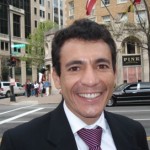By Luis Roberto Zamora Bolaños
Making the decision to abolish a national army requires a great deal of determination and courage. This brave decision relies on the resolve of the country’s people and the values that they hold most sacred. In a demonstration of the people’s commitment to peace, Costa Rica abolished its army in 1948. Shortly thereafter, the Costa Rican Supreme Court would go on to reaffirm peace as a “foundational value of our nation.”
Regrettably, this “foundational value” has been under attack from Costa Rican authorities who are trying to eviscerate, in form and purpose, the great accomplishment of abolishing a standing army in this peaceful country.
The government of Abel Pacheco supported the U.S. and British invasion of Iraq in an act that violated Costa Rica’s peaceful nature and its obligation to neutrality. Faced with massive public protest, the Supreme Court annulled that decision in a case brought by this writer. The decision created a historic precedent for Costa Rica.
Later, the Oscar Arias administration, in reckless abandonment of Costa Rica’s peaceful spirit and policies, authorized uranium extraction for the manufacture of fuel and nuclear reactors for military uses. This measure violated the international system endorsed by the United Nations. In another lawsuit filed by the author, the Supreme Court annulled the government’s authorization and recognized a constitutional right to peace in Costa Rica.
The attacks on peace have continued and the Supreme Court has failed to defend the country’s constitution and laws, much less the will of its people. As the Supreme Court has changed its tune and stood idly by, the country without an army has begun a campaign of arming its police forces with military training and tactics.
Article Twelve of the Costa Rican Constitution both proscribes a standing army in the country and establishes the legal grounding for the conservation of public order: Necessary police forces shall exist. In the event that military forces are needed, they would always been transitory and subordinate to civilian control.
The importance of this article cannot be underestimated, since it not only abolishes the army but firmly and clearly delineates a central pillar of the State—its internal security policy based on civil forces. Costa Rica, as a civil, peaceful, democratic, unarmed republic, places the maintaining national law and order in the hands of the civil police.
It’s an act that reflects the great courage demonstrated by the rejection of armed forces, and was further reaffirmed by the Supreme Court in the landmark 9992-04 case. Article 12 not only abolishes a standing army, but also prohibits the tactical methods of control that are employed by them.
Nonetheless, U.S. soldiers have now been authorized to perform patrols and other police activities in Costa Rica, the legality of which is currently pending litigation. Since 2007, the acquiescence of President Arias has permitted the military training of Costa Rican police in the School of the Americas (now officially named the Western Hemisphere Institute for Security Cooperation or WHINSEC), a fact that came to light thanks to diplomatic cables released by Wikileaks. This case is also before the Supreme Court. It is unconstitutional that Costa Rican police forces receive military training. In fact, any kind of training received from the School of the Americas is by definition unconstitutional for Costa Rican police.
The School of the Americas (WHINSEC), also known as the ‘School of Assassins’ or the ‘School of the Dictators’ due to the activities of many of its graduates, is a center of indoctrination and military-political training belonging to the United States Army and housed at Fort Benning, GA. Throughout its existence, it has directly trained at least eight dictators from Latin America and the personnel of more than eleven dictatorships in the same region.
The objective of the School of the Americas has been clear: maintain the hegemony of the United States through hand-picked puppet governments. To do this, the government has resorted frequently ad often successfully to supporting coup d’ états in Latin America, which commonly make use of terrorist tactics, such as torture, assassinations, kidnapping, and rape.
The inherent contradiction seems grotesquely absurd: Why would a demilitarized country train their police in military schools and terrorist tactics? Of all places, why would they be sent to the School of the Americas?
The official excuse for the military patrols and police training is the so-called “War on Drugs.” But the School of the Americas has also trained drug traffickers themselves, including the grandest of them all, Manuel Noriega, ex-dictator of Panama.
The official excuse is, obviously, hard to believe. By authorizing the delegation of domestic policing powers to foreign soldiers and the training of Costa Rican police in militaristic and terrorist tactics, Costa Rica—the country without an army—is building military security with which to declare and execute peace in the world by placing an army in charge of its citizens (or charging against its citizens).
It’s cruelly ironic that the “country of peace” is at war with itself, destroying the glory that it once uniquely held among all nations. Costa Rica may still be the country without a standing army, but it is now patrolled by military police.
Luis Roberto Zamora Bolaños is a litigator in his native Costa Rica. He has successfully tried cases before the Costa Rican Supreme Court in defense of peace, including the landmark cases that rescinded Costa Rica’s support of the coalition that invaded Iraq and recognized a constitutional right to peace. A specialist in peace and disarmament, Zamora is currently in the process of challenging the legality of the government’s recent anti-peace activities. He collaborates with CIP Americas Program www.americas.org as a regional political analyst.



